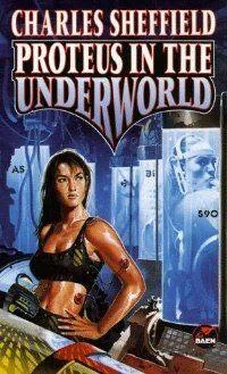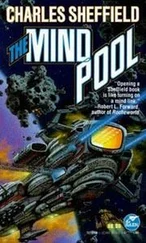Charles Sheffield - Proteus in the Underworld
Здесь есть возможность читать онлайн «Charles Sheffield - Proteus in the Underworld» весь текст электронной книги совершенно бесплатно (целиком полную версию без сокращений). В некоторых случаях можно слушать аудио, скачать через торрент в формате fb2 и присутствует краткое содержание. Год выпуска: 1995, ISBN: 1995, Издательство: Baen Books, Жанр: Фантастика и фэнтези, на английском языке. Описание произведения, (предисловие) а так же отзывы посетителей доступны на портале библиотеки ЛибКат.
- Название:Proteus in the Underworld
- Автор:
- Издательство:Baen Books
- Жанр:
- Год:1995
- ISBN:0-671-87659-7
- Рейтинг книги:3 / 5. Голосов: 1
-
Избранное:Добавить в избранное
- Отзывы:
-
Ваша оценка:
- 60
- 1
- 2
- 3
- 4
- 5
Proteus in the Underworld: краткое содержание, описание и аннотация
Предлагаем к чтению аннотацию, описание, краткое содержание или предисловие (зависит от того, что написал сам автор книги «Proteus in the Underworld»). Если вы не нашли необходимую информацию о книге — напишите в комментариях, мы постараемся отыскать её.
Proteus in the Underworld — читать онлайн бесплатно полную книгу (весь текст) целиком
Ниже представлен текст книги, разбитый по страницам. Система сохранения места последней прочитанной страницы, позволяет с удобством читать онлайн бесплатно книгу «Proteus in the Underworld», без необходимости каждый раз заново искать на чём Вы остановились. Поставьте закладку, и сможете в любой момент перейти на страницу, на которой закончили чтение.
Интервал:
Закладка:
“I would like to see complete records of the birth of the feral forms. I would also like to see all form-change records from the time of first tank entry. Raw data, as well as reduced evaluations. Is that going to be a problem?”
Shoals was scowling at her. “I am confused.” The skin of his forehead wrinkled upward, emphasizing the absence of eyebrows. “You talk as though two different data sets might be involved. Surely you know that all Carcon births take place within a form-change tank?”
She had not known. Sondra started in to work on the form-change records with Bey’s words reverberating as a loud inner voice. You have to go the colonies and see things at first-hand.
The only problem with such advice was that Bey had left out a key variable. It was one that would never have occurred to Sondra, either. Carcon Colony visitors from Earth were rare. In colony terms she was the oddity, the interesting freak that people wanted to stare at.
While she struggled to analyze data sets and concentrate on complex computer displays, scores of Carcons wandered beings so changed and augmented that Sondra could not even guess at their ages. The prizewinner for oddity was a being of indeterminate gender, who seemed determined to explore the inorganic limit of humanity. Arms and legs were steel- and-silicon prostheses, while the torso was a pleated barrel-shaped tube that breathed vertically. The chest section moved up and down with each breath like an upright concertina. The Carcon stood close to Sondra. It stared at her in apparent curiosity, with eyes compound and crystalline in a shiny cranium of plastic metal.
Strangeness all around. Everywhere—except in the records that she was analyzing. After four hours of work the frustration began. The Carcons were peculiar enough for the most eccentric taste, but their form-change equipment could not be more normal. The tanks that had been used to administer the humanity test to the feral forms were a standard BEC model. The seals were unbroken, indicating that they had not been opened since the day they were shipped from an Earth production plant Sondra had next examined the software programs that had been used, reviewing both the intermediate data outputs and the code itself. She had found nothing out of the ordinary, using her own programs or the one that she had received from Bey himself.
The situation was as clear as could be. Sondra reviewed her results:
• two births, odd-looking but not much more so than a thousand others born in the Carcon tanks within the past few years.
• a humanity test, delivered routinely when the subjects were two months old.
• clear passage of the test, without even a suggestion in its results of a marginal case.
• total failure, after that first success, to interact in any way with form-change programs.
• increasing evidence, day after day, that the forms were not merely non-human, but wild, vicious, and dangerous.
The Carcons, eager to proceed as soon as possible with the modifications needed for any form they would consider satisfactory, had been a little more impatient for results than another group might have been. But that was a detail. If the births and tests had taken place on Earth itself, or anywhere else in the system, the same failure of the humanity test would have been recorded by now.
Sondra didn’t like to admit it, but she had reached a dead end already, so soon after her arrival. The problem was not the peculiarity of the data trail she had followed at the Carcon Colony. It was the normalcy that was so frustrating. The remoteness of the independent colony, which led to the feeling that procedures and events would be different here, was an illusion. So far as the purposive form-change needed for the humanity test was concerned, the same results would have been obtained anywhere.
Sondra hated to think about what came next. All this way, after her loud insistence to Denzel Morrone that the journey was absolutely necessary to solve the mystery of the feral forms. And then all the way back, without even a suggestion of an answer.
Worse than Denzel Morrone would be Bey Wolf. He wouldn’t harangue her and gloat over her, the way Denzel would. But his quiet nod would in many ways be harder to take than any number of harsh words. She could imagine that nod now, and interpret: “Just as I suspected. Second-rate brains, she’ll never solve it!”
Sondra was suspecting the same thing herself. Somewhere, somehow, she was missing a key insight. Her only hope was that the next stop on her flight path, at the Fugate Colony, would provide it. After what had happened with the Carcons, Sondra didn’t have much confidence in that prospect.
CHAPTER 11
On the road again; and not sure where it would lead.
Bey stood within the link zone during the final spasm of transition, and wondered. Trudy Melford had urged him to return as soon as possible to Mars and investigate the surface forms. And here he was, reporting for duty just like any other brain-washed BEC employee.
But what had prompted him to quote to Jarvis Dommer an arrival time one day later than he planned to travel?
Bey could answer that, after a fashion, except that his reply had a great big hole in it—or rather, a hundred thousand holes.
The standard Earth/Mars comparison clichй, still trotted out by USF politicians after centuries of use, was the area logic. Earth is largely a water world. Mars is a smaller planet, but it has as much land area as Earth.
Bey had been puzzled by that statement the first time that he heard it. What did total land area have to do with anything? No one on Earth lived at the summit of Mount Everest, just as no one on Mars lived on top of Olympus Mons. No one on Earth lived out on the surface at the North or South Pole. Still less would a sane person try to reside at the Martian poles, where most of the snow was solid carbon dioxide and midsummer was a cold winter’s day in Antarctica, minus air. In any case, land area was almost irrelevant. Humans inhabit three dimensions, not two, and a large planetoid like Ceres, suitably re-structured in its interior to provide thousands of habitat levels, could in principle be the home of more people than lived on Earth.
The colonists on Mars had known all this. With the aid of their machines they had worked not the harsh surface, but the more tractable interior. It was not difficult for the tunneling machines to connect the gas-filled hollow pockets of subsurface Mars so that chamber led to cave led to cavern. After a century of work, a gigantic, multiply-connected, hundred- thousand node network of living space had been created: Old Mars, fully navigable only with the help of a computer.
The exit point for the Melford link lay close to the surface, above most of Old Mars. Bey, emerging from Immigration, stood motionless and stared around him. There were plenty of people greeting arrivals from Earth, but none showed any interest in a plainly-dressed and silent visitor.
That ought to be enough to prick the bubble of curiosity that had brought him early to Mars. Somewhere within the convoluted maze beneath his feet he might find red-beard, the man who had tracked him from Melford Castle to the Mattin Link entry point. But more realistically Bey would not find the man, no matter how hard he searched. The population of Old Mars was tiny by Earth standards, just a few millions—but a million is a big number. Examine the ID of each resident, one after another, and you would be at it for months. And as Bey knew from his work on illegal forms, there were plenty of people in the deep Underworld whose IDs were, to put it charitably, unreliable.
Bey placed the light knapsack that formed his entire luggage on one of the benches of polished synthetic that lined the link exit chamber. He sat down next to it. He was not happy. His vaunted intuition had led him badly astray. What was he going to do now? Back on Earth, he had made two assumptions: that anyone who had knowledge of his movements during his previous visit to Mars would have just as good information now; and if they had been eager to talk to him then, they would still be just as keen.
Читать дальшеИнтервал:
Закладка:
Похожие книги на «Proteus in the Underworld»
Представляем Вашему вниманию похожие книги на «Proteus in the Underworld» списком для выбора. Мы отобрали схожую по названию и смыслу литературу в надежде предоставить читателям больше вариантов отыскать новые, интересные, ещё непрочитанные произведения.
Обсуждение, отзывы о книге «Proteus in the Underworld» и просто собственные мнения читателей. Оставьте ваши комментарии, напишите, что Вы думаете о произведении, его смысле или главных героях. Укажите что конкретно понравилось, а что нет, и почему Вы так считаете.












